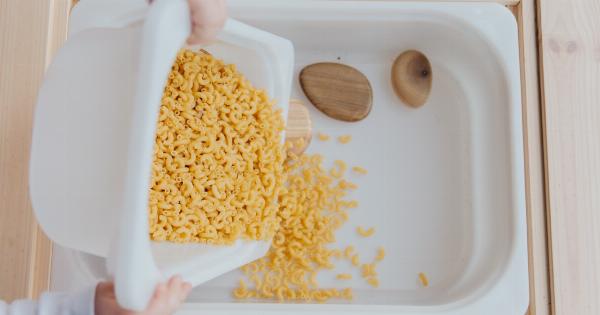As parents, we all want the best for our children. We want them to grow up healthy and strong, and a big part of that is their diet. However, even with the best intentions, we often make mistakes when it comes to feeding our kids.
Here are some common mistakes parents make with their child’s diet, and how to avoid them.
1. Not offering a variety of foods
Children need a variety of foods to get all the nutrients they need. Don’t just offer the same foods over and over again. Try new fruits and vegetables, and mix up your proteins and grains.
2. Offering too many processed foods
Processed foods can be easy and convenient, but they are often high in sugar, salt, and unhealthy fats. Offer fresh foods as much as possible and limit processed foods.
3. Offering sugary drinks
Soda, juice, and other sugary drinks can lead to weight gain and tooth decay. Encourage your child to drink water and offer milk with meals.
4. Not setting a good example
Children learn by example. If you are eating unhealthy foods, your child is more likely to do the same. Make healthy choices and show your child that good nutrition is important.
5. Forcing your child to finish their plate
While it’s important to encourage your child to eat enough, forcing them to finish their plate can lead to overeating and a negative relationship with food.
6. Using food as a reward or punishment
Using food as a reward can lead to an unhealthy relationship with food. Instead, reward your child with non-food items like stickers or a special activity. Similarly, using food as a punishment can also be damaging.
7. Not reading labels
When buying packaged foods, it’s important to read the labels to see what is in them. Look for foods that are low in sugar, salt, and unhealthy fats.
8. Not planning ahead
Planning meals in advance can help you make healthier choices and avoid the convenience of fast food or takeout.
9. Allowing too many snacks
While snacks can be healthy and important for kids, too many can lead to overeating and weight gain. Offer healthy snacks like fruit and vegetables, and limit unhealthy snacks.
10. Not involving your child in meal planning and preparation
Involving your child in meal planning and preparation can help them become interested in healthy foods and develop good habits.
11. Not considering your child’s preferences
While it’s important to encourage your child to try new foods, it’s also important to respect their preferences. Offer a variety of foods and let your child choose what they want to eat.
12. Not offering enough fruits and vegetables
Fruits and vegetables are important sources of vitamins and minerals, and most kids don’t get enough of them. Offer fruits and vegetables at every meal, and encourage your child to try new ones.
13. Offering too much fast food and takeout
Fast food and takeout can be convenient, but they are often high in calories and unhealthy fats. Limit how often you eat out and choose healthier options when you do.
14. Not paying attention to portion sizes
Portion sizes can be hard to gauge, but it’s important to make sure your child is eating the right amount. Don’t force them to finish their plate, but make sure they are eating enough to meet their nutritional needs.
15. Not offering enough protein
Protein is important for growth and development, but many kids don’t get enough. Offer a variety of proteins like meat, beans, and nuts.
16. Not offering enough healthy fats
Healthy fats like those found in avocados, nuts, and fish are important for brain development and overall health. Make sure your child is getting enough healthy fats in their diet.
17. Not offering enough whole grains
Whole grains are an important source of fiber and other nutrients. Offer whole grain bread, pasta, and rice instead of white varieties.
18. Not offering enough calcium
Calcium is important for strong bones and teeth. Offer calcium-rich foods like milk, cheese, and yogurt.
19. Not being consistent
Consistency is important when it comes to feeding your child. Offer healthy foods consistently and limit unhealthy ones.
20. Not addressing food allergies or sensitivities
If your child has a food allergy or sensitivity, it’s important to address it. Talk to your doctor and find alternatives to the foods your child can’t eat.
21. Not addressing chewing or swallowing problems
Sometimes children have difficulty chewing or swallowing certain foods. Talk to your doctor if you notice any issues.
22. Not offering enough water
Water is important for staying hydrated and maintaining good health. Encourage your child to drink water throughout the day.
23. Not setting regular meal times
Regular meal times can help your child develop good eating habits and prevent overeating. Set regular meal times and stick to them as much as possible.
24. Not limiting screen time during meals
Screen time during meals can be distracting and can lead to mindless eating. Encourage your child to focus on their food during meals.
25. Not encouraging physical activity
Physical activity is an important part of a healthy lifestyle. Encourage your child to be active and limit sedentary activities like watching TV or playing video games.
26. Not being patient
It can take time for children to develop good eating habits. Be patient and continue to offer healthy foods and encourage good habits.
27. Not seeking help when needed
If you are unsure about what to feed your child or have concerns about their diet, talk to your doctor or a registered dietitian.
28. Not addressing emotional eating
If your child is using food to deal with emotional issues, it’s important to address it. Talk to your child and seek professional help if needed.
29. Not understanding the importance of breakfast
Breakfast is an important meal that can set the tone for the rest of the day. Make sure your child is eating a healthy breakfast each day.
30. Giving up too easily
Developing good eating habits can be a challenge, but it’s important to stick with it. Don’t give up too easily and continue to offer healthy foods and encourage good habits.






























